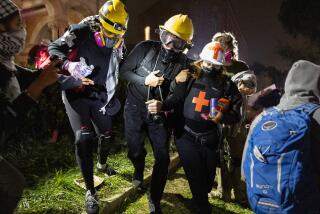New Anaheim Site Fulfills Hi Hopes of Arts College
From a second-floor vista Sunday morning, teacher Doris Walker savored the view--the big auditorium, the two classroom buildings, all that space in Hope/UNICO arts college’s new three-acre campus.
It’s been seven weeks since Walker and her 37 mentally handicapped students moved out of their cramped storefront quarters and into their permanent Anaheim home, the former site of the Euclid Street Baptist Church.
But even now, just before Sunday’s 2 p.m. ribbon-cutting dedication in the 500-seat auditorium off Euclid Street, Walker still looked awe-struck. “I know we’re here at last, our students and supplies are all in,” said Walker, 63, the program’s founding director. “But we’ve worked for so long; we’ve had to overcome so much. We’re only now beginning to accept the fact that our dream has come true. I have to pinch myself.
“Like programs in the public schools and for residential care, our project goes against the old stereotypes,” Walker said. “They demonstrate that the disabled do not have to live in society’s back rooms. The disabled, too, can have full and creative lives.”
To recap Walker’s “dream,” it has been:
--Fifteen years since Walker, then an Anaheim Union High School District teacher, organized the Hi Hopes, a small music troupe for the mentally handicapped, which played at meetings of parents’ groups and other community organizations.
--Seven years since the Hi Hopes, who had graduated to performing at national conventions, became the core of a nonprofit arts center that opened in a $450-a-month Anaheim storefront.
--Four years since UNICO, a national service organization, took the Hi Hopes program under its wing and began seeking a permanent and larger site for the project, formally called Hope University/UNICO National College.
Specialists in the field, including those with a Kennedy Center-affiliated national arts program for the disabled, said the Anaheim project is the only such private arts college in the United States for the mentally handicapped.
And UNICO, which last August acquired the church site in a $2.2-million cash and land-swap agreement, said it seeks to make the Anaheim project the first of other such UNICO-backed colleges.
Based in New Jersey, UNICO is a 7,000-member, Italian-American organization that sponsors mental health-related research, as well as programs for the disadvantaged and handicapped. (UNICO stands for Unity, Neighborliness, Integrity, Community and Opportunity.)
“That’s part of our overall plan, to open other colleges back East and in the Midwest,” said Vincent Lupo, a past president of UNICO and a Hope/UNICO college board member. “But it’s a brand-new field, and we’ll have our hands full just with launching the Anaheim college.”
The program is designed to develop the artistic talents of the developmentally disabled, a term that includes the cerebral palsy-afflicted and the autistic, in addition to the mentally retarded.
The classes are all arts oriented: Music, drama, movement and visual arts are employed to reinforce lessons in spelling, handling money and various household and shopping tasks. Full-time tuition is $600 per semester, but some students receive scholarships from community groups.
The program remains small: 12 full-time and 25 part-time students; 16 paid or volunteer staffers, and an annual operating budget of less than $200,000.
Students are from Orange and Los Angeles counties, and most live at home. Walker said some of the students show artistic talents at the “highly gifted” level.
“With the new home, we now have the room to grow, to add students and bring in more drama and fine-arts instruction and start computer-related courses,” said Walker, who projects a 45-student enrollment by next fall, mostly full-time students.
The school’s capacity is 100 full-time students, the limit imposed by the Anaheim City Council in 1986, when neighboring residents complained that the new school would bring heavy traffic and other “high-density” problems.
(College backers say neighborhood opposition has since subsided. Last June, when the City Council reaffirmed its approval of the Hope/UNICO move-in, no residential protests were made.)
Unlike the program’s old storefront, which was the size of two classrooms, the church site offers 22 classrooms, a large gymnasium, numerous office and storage spaces, as well as the 500-seat auditorium.
Recalled Hi Hopes troupe member Bill Ouderkerken of the move early last month: “When we knew this was really our place, we were so happy. We all felt like crying.”
Lori Reyes, another Hi Hopes member, then added: “It shows us that people care, that they are loving.”
More to Read
Start your day right
Sign up for Essential California for news, features and recommendations from the L.A. Times and beyond in your inbox six days a week.
You may occasionally receive promotional content from the Los Angeles Times.






